AI
-
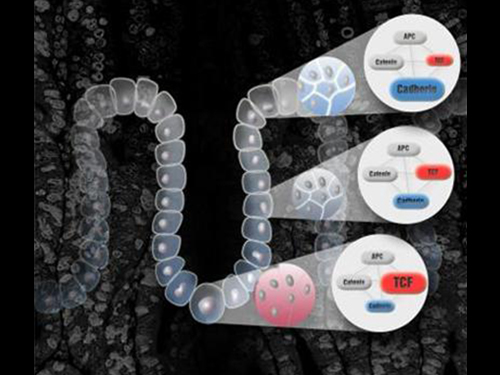 Hidden Mechanism for the Suppression of Colon Cancer Identified
Published in Cell Reports : cells at the risk of causing colorectal cancer due to genetic mutation are discharged outside the colon tissue
Korean researchers have successfully identified the cancer inhibitory mechanism of the colon tissue. The discovery of the inherent defense mechanism of the colon tissues is expected to provide understanding of the cause of colorectal cancer.
The research was led by Kwang-Hyun Cho, a professor of Bio and Brain Engineering at KAIST (corresponding author) and participated by Dr. Jehun Song (the first author), as well as Dr. Owen Sansom, David Huels, and Rachel Ridgway from the Beatson Institute for Cancer Research in the UK and Dr. Walter Kolch from Conway Institute in Ireland.
The research was funded by the Ministry of Science, ICT and Future Planning and the National Research Foundation of Korea, and its results were published in the 28th March online edition of Cell Reports under the title of “The APC network regulates the removal of mutated cells from colonic crypts.”
The organism can repair damaged tissues by itself, but genetic mutations, which may cause cancer, can occur in the process of cell division s for the repair. The rapid cell division s and toxic substances from the digestive process cause a problem especially in colon crypt that has a high probability for genetic mutation.
The research team was able to find out that the colon tissues prevent cancer by rapidly discharging carcinogenic cells with genetic mutations from the colon crypt durin ga frequent tissue repair process.
This defense mechanism, which inhibits abnormal cell division s by reducing the time mutated cells reside in the crypt, is inherent in the colon.
Extensive mathematical simulation results show that the mutated cells with enhanced Wnt signaling acquire increased adhesion in comparison to the normal cells, which therefore move rapidly toward the upper part of the crypt and are discharged more easily.
If beta-catenine, the key factor in Wnt signal transduction pathway, is not degraded due to genetic mutation, the accumulated beta-catenine activates cell proliferation and increases cell adhesion. The special environment of crypt tissue and the tendency of the cells with similar adhesion to aggregate will therefore discharge the mutated cell, hence maintaining the tissue homeostasis.
In vivo experiment with a mouse model confirms the simulation results that, in the case of abnormal crypt, the cells with high proliferation in fact move slower.
Professor Cho said, “This research has identified that multicellular organism is exquisitely designed to maintain the tissue homeostasis despite abnormal cell mutation. This also proves the systems biology research, which is a convergence of information technology and bio-technology , can discover hidden mechanisms behind complex biological phenomena.”
Crypt: Epithelium, consisting of approximately 2,000 cells, forms a colon surface in the shape of a cave.
Wnt Signaling: A signal transduction pathway involved in the proliferation and differentiation of cells that are particularly important for the embryonic development and management of adult tissue homeostasis.
2014.04.17 View 13207
Hidden Mechanism for the Suppression of Colon Cancer Identified
Published in Cell Reports : cells at the risk of causing colorectal cancer due to genetic mutation are discharged outside the colon tissue
Korean researchers have successfully identified the cancer inhibitory mechanism of the colon tissue. The discovery of the inherent defense mechanism of the colon tissues is expected to provide understanding of the cause of colorectal cancer.
The research was led by Kwang-Hyun Cho, a professor of Bio and Brain Engineering at KAIST (corresponding author) and participated by Dr. Jehun Song (the first author), as well as Dr. Owen Sansom, David Huels, and Rachel Ridgway from the Beatson Institute for Cancer Research in the UK and Dr. Walter Kolch from Conway Institute in Ireland.
The research was funded by the Ministry of Science, ICT and Future Planning and the National Research Foundation of Korea, and its results were published in the 28th March online edition of Cell Reports under the title of “The APC network regulates the removal of mutated cells from colonic crypts.”
The organism can repair damaged tissues by itself, but genetic mutations, which may cause cancer, can occur in the process of cell division s for the repair. The rapid cell division s and toxic substances from the digestive process cause a problem especially in colon crypt that has a high probability for genetic mutation.
The research team was able to find out that the colon tissues prevent cancer by rapidly discharging carcinogenic cells with genetic mutations from the colon crypt durin ga frequent tissue repair process.
This defense mechanism, which inhibits abnormal cell division s by reducing the time mutated cells reside in the crypt, is inherent in the colon.
Extensive mathematical simulation results show that the mutated cells with enhanced Wnt signaling acquire increased adhesion in comparison to the normal cells, which therefore move rapidly toward the upper part of the crypt and are discharged more easily.
If beta-catenine, the key factor in Wnt signal transduction pathway, is not degraded due to genetic mutation, the accumulated beta-catenine activates cell proliferation and increases cell adhesion. The special environment of crypt tissue and the tendency of the cells with similar adhesion to aggregate will therefore discharge the mutated cell, hence maintaining the tissue homeostasis.
In vivo experiment with a mouse model confirms the simulation results that, in the case of abnormal crypt, the cells with high proliferation in fact move slower.
Professor Cho said, “This research has identified that multicellular organism is exquisitely designed to maintain the tissue homeostasis despite abnormal cell mutation. This also proves the systems biology research, which is a convergence of information technology and bio-technology , can discover hidden mechanisms behind complex biological phenomena.”
Crypt: Epithelium, consisting of approximately 2,000 cells, forms a colon surface in the shape of a cave.
Wnt Signaling: A signal transduction pathway involved in the proliferation and differentiation of cells that are particularly important for the embryonic development and management of adult tissue homeostasis.
2014.04.17 View 13207 -
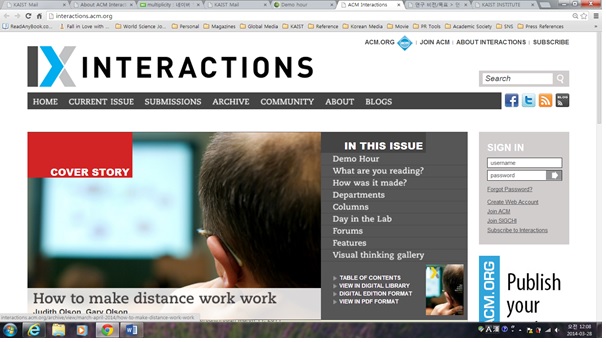 ACM Interactions: Demo Hour, March and April 2014 Issue
The
Association for Computing Machinery (ACM), the largest educational and scientific
computing society in the world, publishes a magazine called
Interactions
bi-monthly.
Interactions
is the flagship magazine
for the ACM’s Special Interest Group on Computer-Human Interaction (SIGCHI) with
a global circulation that includes all SIGCHI members.
In
its March and April 2014 issue, the Smart E-book was introduced. It was developed by Sangtae Kim, Jaejeung
Kim, and Soobin Lee at the Information Technology Convergence in KAIST
Institute, KAIST.
For
the article, please go to the link or download the .pdf files below:
Interactions,
March &
April 2014
Demo Hour: Bezel-Flipper
Bezel-Flipper
Interactions_Mar & Apr 2014.pdf
http://interactions.acm.org/archive/view/march-april-2014/demo-hour29
2014.03.28 View 11954
ACM Interactions: Demo Hour, March and April 2014 Issue
The
Association for Computing Machinery (ACM), the largest educational and scientific
computing society in the world, publishes a magazine called
Interactions
bi-monthly.
Interactions
is the flagship magazine
for the ACM’s Special Interest Group on Computer-Human Interaction (SIGCHI) with
a global circulation that includes all SIGCHI members.
In
its March and April 2014 issue, the Smart E-book was introduced. It was developed by Sangtae Kim, Jaejeung
Kim, and Soobin Lee at the Information Technology Convergence in KAIST
Institute, KAIST.
For
the article, please go to the link or download the .pdf files below:
Interactions,
March &
April 2014
Demo Hour: Bezel-Flipper
Bezel-Flipper
Interactions_Mar & Apr 2014.pdf
http://interactions.acm.org/archive/view/march-april-2014/demo-hour29
2014.03.28 View 11954 -
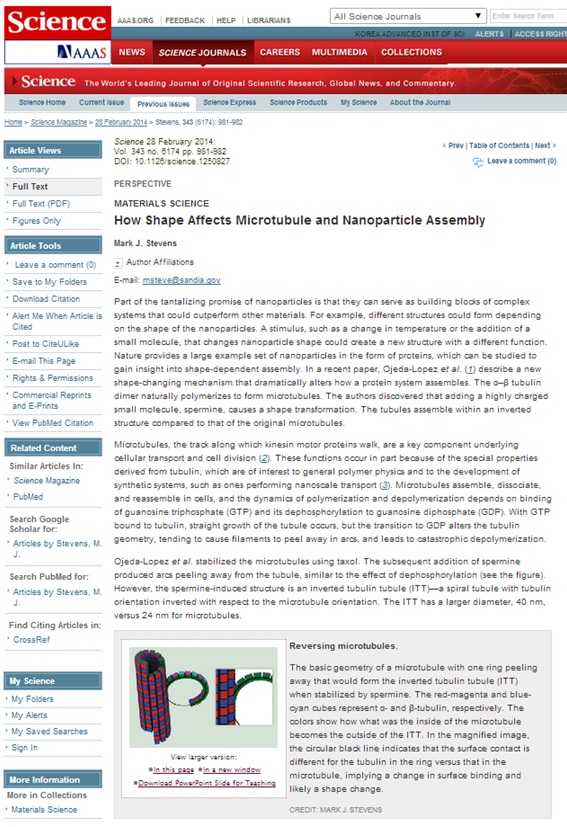 A research paper by Professor Myung-Chul Choi reviewed in Science (February 28, 2014)
A research paper entitled “Transformation of taxol-stabilized microtubules into inverted tubulin tubules triggered by a tubulin conformation switch” was published in
Nature Materials
this year, dated January 19, 2014.
Professor Myung-Chul Choi and Dr. Chae-Yeon Song from the Department of Bio and Brain Engineering at KAIST co-authored the paper together with researchers from the University of California in Santa Barbara and the Hebrew University of Jerusalem.
Science,
dated February 28, 2014, has recently reviewed the paper in its section called "Perspectives."
2014.03.13 View 9796
A research paper by Professor Myung-Chul Choi reviewed in Science (February 28, 2014)
A research paper entitled “Transformation of taxol-stabilized microtubules into inverted tubulin tubules triggered by a tubulin conformation switch” was published in
Nature Materials
this year, dated January 19, 2014.
Professor Myung-Chul Choi and Dr. Chae-Yeon Song from the Department of Bio and Brain Engineering at KAIST co-authored the paper together with researchers from the University of California in Santa Barbara and the Hebrew University of Jerusalem.
Science,
dated February 28, 2014, has recently reviewed the paper in its section called "Perspectives."
2014.03.13 View 9796 -
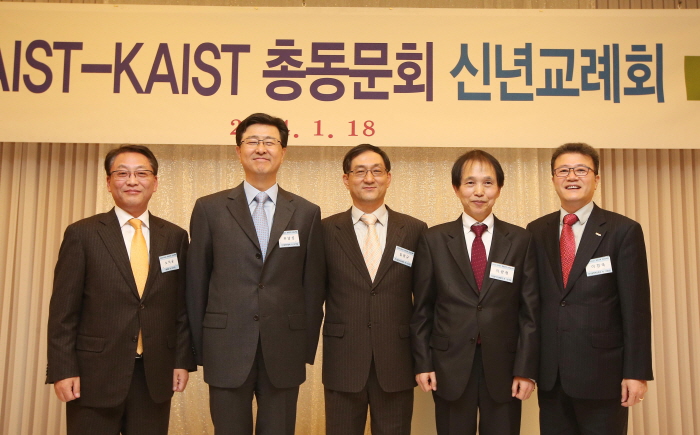 2013 KAIST Alumni of the Year Awarded
The KAIST Alumni Association announced four winners as the 2013 KAIST Alumni of the Year. From left to right, recipients were Nam-Sung Woo, President of Samsung Electronics; Seok-Kyun Noh, President of Yeungnam University; Kwang-Hyung Lee, Professor at KAIST; and Kyung-Guk Lee, CEO of TV Logic.The award ceremony was held during a New Year’s ceremony, sponsored by the Alumni Association, on January 18 at the Palace Hotel in Seoul.President Woo, entering class of ’75 for masters in electrical engineering, was recognized for his devotion to the development of semiconductor industry including expansion of the mobile Central Processing Unit (CPU) business as well as his contribution to national industry development through improving technology for System on Chip (SoC) products.President Noh, entering class of ‘77 for masters in chemistry, was recognized for his devotion to education and the development of science and technology as the co-president of the Promotion Proclamation of the Citizens’ Coalition for Scientific Society and as the head of Human Resources Development for Brain Korea 21 (BK21).Professor Lee, entering class of ’78 for masters in industrial engineering, has been a leader in the collaboration of education and science through founding the Department of Bio & Brain Engineering and the Graduate School of Future Strategy at KAIST. His active support for business ideas from labs has helped produce ventures such as Nexon and IDIS. President Lee, entering class of ’82 for masters in electrical engineering, contributed to the development of HD broadcasting monitors and related items by founding TV Logic. He was also recognized for his devotion to the alumni association.The Alumni Association has been selecting winners who have contributed to society and remain devoted to KAIST since 1992.
2014.01.29 View 8121
2013 KAIST Alumni of the Year Awarded
The KAIST Alumni Association announced four winners as the 2013 KAIST Alumni of the Year. From left to right, recipients were Nam-Sung Woo, President of Samsung Electronics; Seok-Kyun Noh, President of Yeungnam University; Kwang-Hyung Lee, Professor at KAIST; and Kyung-Guk Lee, CEO of TV Logic.The award ceremony was held during a New Year’s ceremony, sponsored by the Alumni Association, on January 18 at the Palace Hotel in Seoul.President Woo, entering class of ’75 for masters in electrical engineering, was recognized for his devotion to the development of semiconductor industry including expansion of the mobile Central Processing Unit (CPU) business as well as his contribution to national industry development through improving technology for System on Chip (SoC) products.President Noh, entering class of ‘77 for masters in chemistry, was recognized for his devotion to education and the development of science and technology as the co-president of the Promotion Proclamation of the Citizens’ Coalition for Scientific Society and as the head of Human Resources Development for Brain Korea 21 (BK21).Professor Lee, entering class of ’78 for masters in industrial engineering, has been a leader in the collaboration of education and science through founding the Department of Bio & Brain Engineering and the Graduate School of Future Strategy at KAIST. His active support for business ideas from labs has helped produce ventures such as Nexon and IDIS. President Lee, entering class of ’82 for masters in electrical engineering, contributed to the development of HD broadcasting monitors and related items by founding TV Logic. He was also recognized for his devotion to the alumni association.The Alumni Association has been selecting winners who have contributed to society and remain devoted to KAIST since 1992.
2014.01.29 View 8121 -
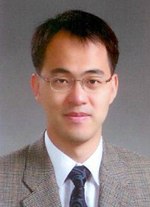 Professor Yoon-Key Nam Received the 2013 Emerging Scholars Award
Professor Yoon-Key Nam, the Department of Bio and Brain Engineering at KAIST, received the 2013 Emerging Scholars Award from the Korean BioChip Society (KBCS), an organization consisted of professionals and researchers in the biochip field such as proteomics, functional genomics, Bio-MEMS, nanotechnology, biosensors, and bioinformatics, at the fall annual conference of KBCS held on November 13th, 2013 at Kangwon National University in Korea.
Professor Nam was recognized for his development of neuron-on-a-chip technology through the convergence research of neuroscience and biochip.
Since 2008, the KBCS has been giving an award to one or two scholars under 40 years of age who have made a great stride in biochip research.
2014.01.27 View 9287
Professor Yoon-Key Nam Received the 2013 Emerging Scholars Award
Professor Yoon-Key Nam, the Department of Bio and Brain Engineering at KAIST, received the 2013 Emerging Scholars Award from the Korean BioChip Society (KBCS), an organization consisted of professionals and researchers in the biochip field such as proteomics, functional genomics, Bio-MEMS, nanotechnology, biosensors, and bioinformatics, at the fall annual conference of KBCS held on November 13th, 2013 at Kangwon National University in Korea.
Professor Nam was recognized for his development of neuron-on-a-chip technology through the convergence research of neuroscience and biochip.
Since 2008, the KBCS has been giving an award to one or two scholars under 40 years of age who have made a great stride in biochip research.
2014.01.27 View 9287 -
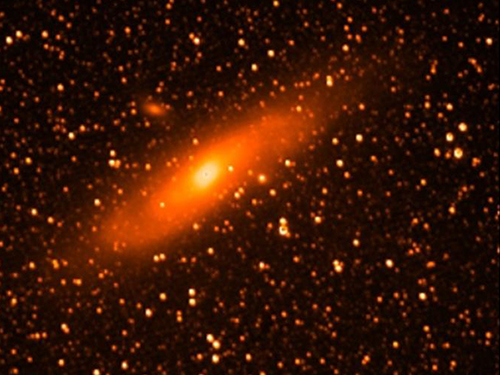 Space Observatory Video by Science & Technology Satellite No. 3 Released
Images of the Andromeda Galaxy, the Orion Nebula, and the Rosetta Nebula taken by the Science & Technology Satellite No. 3, which was built by the KAIST Satellite Technology Research Center and launched at the Yasny launch site in Russia, were released on December 17, 21 st and 22 nd , 2013.
The Andromeda Galaxy (M31) is the nearest spiral galaxy and is located about two million light years away from the earth. The first image received was an infrared image recorded by the space telescope loaded in the satellite.
Research using the satellite’s infrared camera and imaging spectrometer for observing the Earth will also be conducted until February, 2014. After that, the satellite will be collecting images on infrared cosmic background radiation and exploring the galactic plane at a height of 600 km for two years. The infrared and spectrometer images from the Earth observation can be utilized for disaster monitoring and applied to basic research for the detection of wildfires and urban heat island effect as well as flood damage observation and water quality prediction.
Infrared Light Observed in the Universe, Andromeda Galaxy
2014.01.13 View 9578
Space Observatory Video by Science & Technology Satellite No. 3 Released
Images of the Andromeda Galaxy, the Orion Nebula, and the Rosetta Nebula taken by the Science & Technology Satellite No. 3, which was built by the KAIST Satellite Technology Research Center and launched at the Yasny launch site in Russia, were released on December 17, 21 st and 22 nd , 2013.
The Andromeda Galaxy (M31) is the nearest spiral galaxy and is located about two million light years away from the earth. The first image received was an infrared image recorded by the space telescope loaded in the satellite.
Research using the satellite’s infrared camera and imaging spectrometer for observing the Earth will also be conducted until February, 2014. After that, the satellite will be collecting images on infrared cosmic background radiation and exploring the galactic plane at a height of 600 km for two years. The infrared and spectrometer images from the Earth observation can be utilized for disaster monitoring and applied to basic research for the detection of wildfires and urban heat island effect as well as flood damage observation and water quality prediction.
Infrared Light Observed in the Universe, Andromeda Galaxy
2014.01.13 View 9578 -
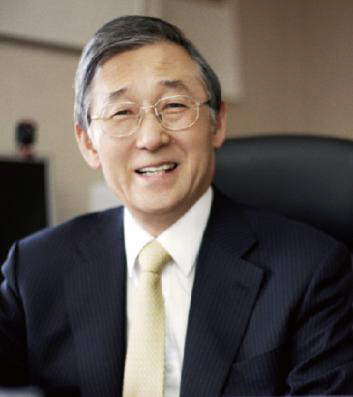 The President of the KAIST Board of Trustees Newly Appointed
President Jang-Moo Lee of the KAIST Board of Trustees
The Board of Trustees, KAIST, met on November 20th at the Marriott Hotel in Seoul. Issues discussed at the board were the appointment of ombudspersons, recruitment of new faculty, and establishment of mid- and long-term development plans for KAIST.
The board also selected its new president, Dr. Jang-Moo Lee, the 24th president of Seoul National University (SNU) from 2006 to 2010 and a professor emeritus of mechanical engineering at SNU. Dr. Lee will serve the board for three years, beginning his duties on November 29th, 2013.
2013.12.10 View 7460
The President of the KAIST Board of Trustees Newly Appointed
President Jang-Moo Lee of the KAIST Board of Trustees
The Board of Trustees, KAIST, met on November 20th at the Marriott Hotel in Seoul. Issues discussed at the board were the appointment of ombudspersons, recruitment of new faculty, and establishment of mid- and long-term development plans for KAIST.
The board also selected its new president, Dr. Jang-Moo Lee, the 24th president of Seoul National University (SNU) from 2006 to 2010 and a professor emeritus of mechanical engineering at SNU. Dr. Lee will serve the board for three years, beginning his duties on November 29th, 2013.
2013.12.10 View 7460 -
 Cambridge University Press and HISTAC to Publish Science and Civilization in Korea
The KAIST Research Institute for the History of Science, Technology and Civilization of Korea (HISTAC) and Cambridge University Press have agreed to publish a 10-volume collection entitled “Science and Civilization in Korea” in collaboration with the Needham Research Institute.
HISTAC was found in December 2012 with the support of the Academy of Korean Studies and the Korean Studies Promotion Service with the aim of publishing a collection composed of 30 Korean books and 7 English books on Korean science and civilization.
By November 2013, the HISTAC research team submitted a research paper composed of 11 Korean and 1 English book. It has now exceeded its initial goal of publishing 7 English books by signing the recent agreement with the Cambridge University Press.
“Science and Civilization in Korea” is the second collection of non-western science to be published by the Cambridge University Press since 1954 following “Science and Civilization in China” by Joseph Needham who is well-known for his momentous achievements in history of science in East Asia. This collection will highlight the achievements of Korea in science and civilization of Korea, much of which has been under-valued compared to those of China and Japan.[ It now has the significance similar to the Western science and civilization].
HISTAC appointed Professor Hong-Gi Yoon from the University of Auckland as the translator and invited Professor Christopher Cullen from Cambridge University and Professor Morris Low from the University of Queensland as co-editors. Professor Cullen was an editor of “Science and Civilization in China” and is now the director of the Needham Research Institute and Professor Low is an expert in modern science of East Asia.
The series includes:
- History of Science and Technology in Korea
- Technology, Everyday Life, and Korean Civilization
- History and Cultural Studies of Geomancy in Korea
- Patients, Doctors and the State: History of Korean Medical and Pharmaceutical Culture
- History of Astronomy in Korea
- Mathematics and the History of Korean Civilization
- The West and Korea in the History of Science and Technology, 1600-1950
- Imperialism, Colonialism, Post-colonialism and Technological Science in Korea
- Development of Science and Technology Under the Korean Authoritarian Regime
- Dynamics of Technological Development in Korean Industrialization
The HISTAC team believes that the publication will illuminate the nation’s triumphs in science and technology and expects that the publication will serve as valuable research resources for the study of the history of East Asian scientific civilization which has mainly focused on China and Japan. Further, by adopting various case studies of scientific achievements of South Korea and developing countries, they hope to propose a new model for studying history of science and civilization.
2013.11.28 View 10107
Cambridge University Press and HISTAC to Publish Science and Civilization in Korea
The KAIST Research Institute for the History of Science, Technology and Civilization of Korea (HISTAC) and Cambridge University Press have agreed to publish a 10-volume collection entitled “Science and Civilization in Korea” in collaboration with the Needham Research Institute.
HISTAC was found in December 2012 with the support of the Academy of Korean Studies and the Korean Studies Promotion Service with the aim of publishing a collection composed of 30 Korean books and 7 English books on Korean science and civilization.
By November 2013, the HISTAC research team submitted a research paper composed of 11 Korean and 1 English book. It has now exceeded its initial goal of publishing 7 English books by signing the recent agreement with the Cambridge University Press.
“Science and Civilization in Korea” is the second collection of non-western science to be published by the Cambridge University Press since 1954 following “Science and Civilization in China” by Joseph Needham who is well-known for his momentous achievements in history of science in East Asia. This collection will highlight the achievements of Korea in science and civilization of Korea, much of which has been under-valued compared to those of China and Japan.[ It now has the significance similar to the Western science and civilization].
HISTAC appointed Professor Hong-Gi Yoon from the University of Auckland as the translator and invited Professor Christopher Cullen from Cambridge University and Professor Morris Low from the University of Queensland as co-editors. Professor Cullen was an editor of “Science and Civilization in China” and is now the director of the Needham Research Institute and Professor Low is an expert in modern science of East Asia.
The series includes:
- History of Science and Technology in Korea
- Technology, Everyday Life, and Korean Civilization
- History and Cultural Studies of Geomancy in Korea
- Patients, Doctors and the State: History of Korean Medical and Pharmaceutical Culture
- History of Astronomy in Korea
- Mathematics and the History of Korean Civilization
- The West and Korea in the History of Science and Technology, 1600-1950
- Imperialism, Colonialism, Post-colonialism and Technological Science in Korea
- Development of Science and Technology Under the Korean Authoritarian Regime
- Dynamics of Technological Development in Korean Industrialization
The HISTAC team believes that the publication will illuminate the nation’s triumphs in science and technology and expects that the publication will serve as valuable research resources for the study of the history of East Asian scientific civilization which has mainly focused on China and Japan. Further, by adopting various case studies of scientific achievements of South Korea and developing countries, they hope to propose a new model for studying history of science and civilization.
2013.11.28 View 10107 -
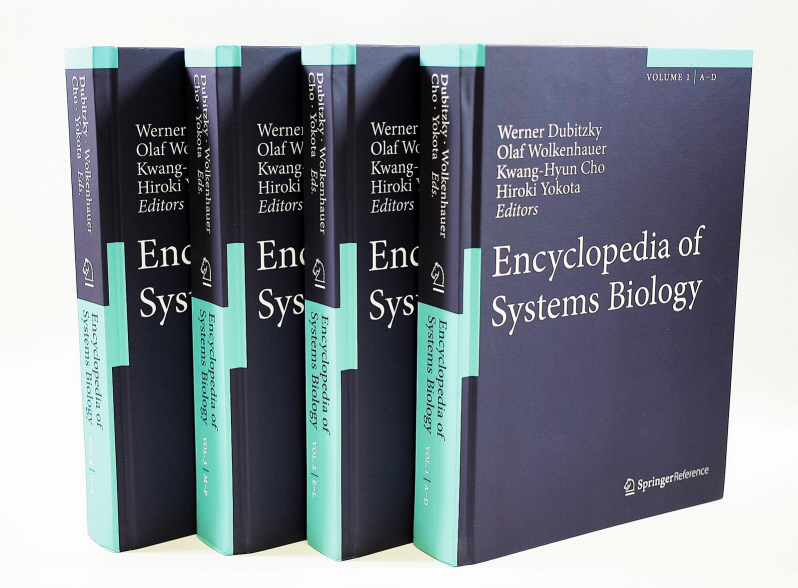 Professor Kwang-Hyun Cho publishes Encyclopaedia of Systems Biology
Professor Kwang-Hyun Cho
KAIST Biological and Brain Engineering Department’s Professor Kwang-Hyun Cho edited the Encyclopaedia of Systems Biology with three scholars, all experts of Systems Biology in England, Germany and the United States. It is rare that a Korean scientist edits a world renowned academic science encyclopaedia.
The Encyclopaedia, published by the New York office of Springer Verlag, was a grand international project five years in the making by 28 editors and 391 scientists with expertise in Systems Biology from around the world. The Encyclopaedia compiles various research areas of Systems Biology, the new academic paradigm of the 21st century through the integration of IT and BT, comprehensively on 3,000 pages in 4 four volumes.
Professor Kwang-Hyun Cho, who led this international project, majored in electrical engineering and pioneered the field of Systems Biology, the integrated study of biological sciences and engineering, as a new integrated field of IT since the 1990s. The professor has achieved various innovative research results since then. Recently he has investigated “kernel,” an evolutionary core structure in complex biological networks and developed a new cancer treatment through the state space analysis of the molecular network of cancer cells. His work was published in Science Signalling, a sister journal of Science, as a cover story several times, and contributed to foundational research as well as commercialisation of the integrated fields of IT and BT.
2013.08.27 View 10872
Professor Kwang-Hyun Cho publishes Encyclopaedia of Systems Biology
Professor Kwang-Hyun Cho
KAIST Biological and Brain Engineering Department’s Professor Kwang-Hyun Cho edited the Encyclopaedia of Systems Biology with three scholars, all experts of Systems Biology in England, Germany and the United States. It is rare that a Korean scientist edits a world renowned academic science encyclopaedia.
The Encyclopaedia, published by the New York office of Springer Verlag, was a grand international project five years in the making by 28 editors and 391 scientists with expertise in Systems Biology from around the world. The Encyclopaedia compiles various research areas of Systems Biology, the new academic paradigm of the 21st century through the integration of IT and BT, comprehensively on 3,000 pages in 4 four volumes.
Professor Kwang-Hyun Cho, who led this international project, majored in electrical engineering and pioneered the field of Systems Biology, the integrated study of biological sciences and engineering, as a new integrated field of IT since the 1990s. The professor has achieved various innovative research results since then. Recently he has investigated “kernel,” an evolutionary core structure in complex biological networks and developed a new cancer treatment through the state space analysis of the molecular network of cancer cells. His work was published in Science Signalling, a sister journal of Science, as a cover story several times, and contributed to foundational research as well as commercialisation of the integrated fields of IT and BT.
2013.08.27 View 10872 -
 Prof. Jong Chul Ye Appointed as the Editor of IEEE TIP
Professor Jong Chul Ye
KAIST Bio & brain engineering department’s Professor Jong Chul Ye has been appointed as the editor of the "IEEE image processing transactions (IEEE TIP, IEEE Transaction on Image Processing)’, a prominent journal in the sector of imaging and medical image processing.
Professor Ye will act as the editor in the field of medical imaging from February 2013 to January 2016, during which he will participate in examining thesis, establishing the direction of the journal and more.
Professor Jong Chul Ye was recognized for his notable work in the field of medical imaging research using compressed sensing for the development of a high resolution medical image reconstruction techniques. This technique has pioneered a new area that is applicable in magnetic resonance imaging (MRI), computed tomography (CT), positron emission Camcorder (PET) and brain imaging.
On the other hand, “IEEE TIP” was first published in 1992 and is currently the world’s leading authority in the field of image processing, medical imaging, image acquisition, compression and output.
2013.02.21 View 11716
Prof. Jong Chul Ye Appointed as the Editor of IEEE TIP
Professor Jong Chul Ye
KAIST Bio & brain engineering department’s Professor Jong Chul Ye has been appointed as the editor of the "IEEE image processing transactions (IEEE TIP, IEEE Transaction on Image Processing)’, a prominent journal in the sector of imaging and medical image processing.
Professor Ye will act as the editor in the field of medical imaging from February 2013 to January 2016, during which he will participate in examining thesis, establishing the direction of the journal and more.
Professor Jong Chul Ye was recognized for his notable work in the field of medical imaging research using compressed sensing for the development of a high resolution medical image reconstruction techniques. This technique has pioneered a new area that is applicable in magnetic resonance imaging (MRI), computed tomography (CT), positron emission Camcorder (PET) and brain imaging.
On the other hand, “IEEE TIP” was first published in 1992 and is currently the world’s leading authority in the field of image processing, medical imaging, image acquisition, compression and output.
2013.02.21 View 11716 -
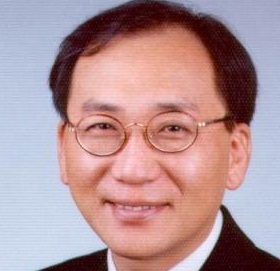 Professor Cho Young-ho wins 'E2 Star' award
Professor Cho Young-ho from the Department of Bio and Brain Engineering at KAIST was chosen as the ‘E2 Star’ at the ‘2012 Engineering Education Festa’ in academics. The ‘2012 Engineering Education Festa’ hosted by the Ministry of Education, Science and Technology was held to display outstanding research results and to conceptualize the future of science education.
The ‘E2 star’ award is given to renowned figures in industry, academia and society. A total of 35 candidates were recommended for the 3 fields and Professor Cho received the first place in the online voting.
Professor Cho received high marks for his work in engineering education, research development and increasing the communication between academia and industry, as well as the commercialization of science and technology. Professor Cho was especially praised for the specialization of engineering education in integrated fields and the joint research with US and Swiss universities.
Professor Cho Young-ho(Department of Bio and Brain Engineering, KAIST)
2012.12.26 View 12036
Professor Cho Young-ho wins 'E2 Star' award
Professor Cho Young-ho from the Department of Bio and Brain Engineering at KAIST was chosen as the ‘E2 Star’ at the ‘2012 Engineering Education Festa’ in academics. The ‘2012 Engineering Education Festa’ hosted by the Ministry of Education, Science and Technology was held to display outstanding research results and to conceptualize the future of science education.
The ‘E2 star’ award is given to renowned figures in industry, academia and society. A total of 35 candidates were recommended for the 3 fields and Professor Cho received the first place in the online voting.
Professor Cho received high marks for his work in engineering education, research development and increasing the communication between academia and industry, as well as the commercialization of science and technology. Professor Cho was especially praised for the specialization of engineering education in integrated fields and the joint research with US and Swiss universities.
Professor Cho Young-ho(Department of Bio and Brain Engineering, KAIST)
2012.12.26 View 12036 -
 1st Korean Certified Fund Raising Executive
Ms. Kim Hyun Soo (KAIST Development Foundation) has become the 1st Korean Certified Fund Raising Executive (CFRE).
Ms. Kim received an email from International Certified Fund Raising Committee indicating that she had passed the CFRE program and that she was the 1st Korean to do so.
CFRE is an internationally certified fund raising expert and there are 5,322 members worldwide working in various universities, hospitals, and non-profit organizations.
Ms. Kim majored in Science of Public Administration (Yonsei University) as B.A. and International Cooperation (Seoul National University) as Masters. She passed the Accounting Exam in the United States and tried to do something worthwhile rather than blindly chasing higher pay.
Ms. Kim played a crucial part in raising record funds in KAIST history since she started in 2006. She commented that she always was interested in non-profit organizations and their role in society and that KAIST allowed her to fulfill both of her two dreams.
2012.10.16 View 8273
1st Korean Certified Fund Raising Executive
Ms. Kim Hyun Soo (KAIST Development Foundation) has become the 1st Korean Certified Fund Raising Executive (CFRE).
Ms. Kim received an email from International Certified Fund Raising Committee indicating that she had passed the CFRE program and that she was the 1st Korean to do so.
CFRE is an internationally certified fund raising expert and there are 5,322 members worldwide working in various universities, hospitals, and non-profit organizations.
Ms. Kim majored in Science of Public Administration (Yonsei University) as B.A. and International Cooperation (Seoul National University) as Masters. She passed the Accounting Exam in the United States and tried to do something worthwhile rather than blindly chasing higher pay.
Ms. Kim played a crucial part in raising record funds in KAIST history since she started in 2006. She commented that she always was interested in non-profit organizations and their role in society and that KAIST allowed her to fulfill both of her two dreams.
2012.10.16 View 8273